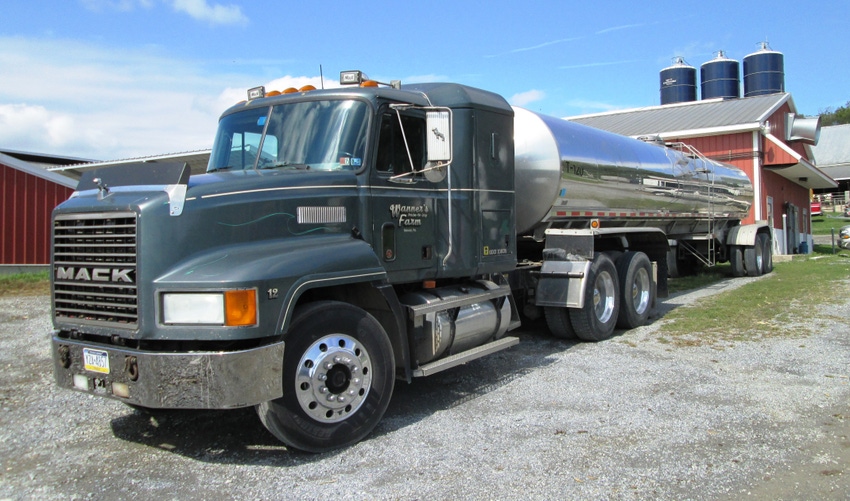New plants could keep more than 20% of state’s milk supply within state.
January 4, 2018

A new study shows promise for Pennsylvania and dairy processors looking to relocate or expand their operations. In short, it revealed that two new plants in Pennsylvania for processing “other” cheeses — non-American types, including Italian and specialty cheeses — could significantly reduce overall supply chain costs, enhance the marginal value of milk for producers and create more than 1,000 jobs while also adding $1.5 billion in economic activity to the state.
“Dairy is a large part of our agriculture industry, and we know there are too many dairy farmers struggling now because of a glut in the market for fluid milk and persistently low prices,” Pennsylvania agriculture secretary Russell Redding said. “While there is some reason for optimism down the road, the reality is that the market is unlikely to change measurably in the short term under the status quo. That is why Gov. (Tom) Wolf and his administration have been working aggressively to expand the processing capacity in Pennsylvania — adding value here, which will boost demand, offer better prices to farmers and reduce costs for processors. This study paints a very promising picture of the potential that exists in Pennsylvania.”
The study assessed the economic impact and potential change in milk prices to farmers and in supply chain costs by adding processing capacity at 21 possible locations in Pennsylvania, as well as under a second scenario of two additional plants at locations that provided the greatest potential benefits. In both cases, new plants could keep more than 20% of the state’s milk supply in Pennsylvania rather than shipping it out of state for processing.
Keeping more milk in Pennsylvania would reduce hauling costs and increase milk premiums for farmers, the report suggested. The net benefit could amount to $35 million per year under the “two-plant scenario” and $48 million per year under the “All Pennsylvania locations” scenario that covered each of the 21 potential sites. Under the two-plant scenario, hauling costs would be reduced by 5 cents/cwt., and the value of milk premiums to farmers on a statewide average would increase 26-29 cents/cwt.
According to the authors, these benefits would justify investments of between $430 million and $600 million in expanding Pennsylvania’s processing capacity. Such investment would increase the value of dairy products produced in Pennsylvania by between $599 million and $921 million, add between $1.5 billion and $2.3 billion in additional economic activity and create between 1,100 and 1,700 jobs.
Processing plants that produce non-American-type cheeses offered the greatest benefits, but the report noted that the state and its dairy farmers would also benefit from plants specializing in other products such as ice cream, whey protein concentrates, lactose and Greek yogurt.
“This report makes clear that there is tremendous potential in Pennsylvania and that dairy processors should seriously consider the state when making their site selection decisions,” Redding said. “Since taking office, Gov. Wolf has invested tens of millions of dollars in Pennsylvania’s agricultural industry, and he is committed to using every available resource to improve our dairy economy.”
Secretary Dennis Davin of the Pennsylvania Department of Community & Economic Development said, “Reinvestment in Pennsylvania’s dairy industry is critical to future opportunities to grow this important economic engine. Additional investments in dairy processing would create all-new opportunities that could turn the tide for state dairy farmers. With the combined capacity to process a total of 4 million lb. of milk per day, new plants could be constructed in areas with high milk production to minimize shipping costs.”
Since taking office in 2015, Wolf has assembled more than $500 million in leveraged investment by agribusinesses through job-creating grants, loans, tax credits and workforce training.
During the past year, Wolf's administration has worked actively to encourage dairy processors to expand in Pennsylvania. Secretaries Redding and Davin have worked closely with the governor’s Action Team and the Center for Dairy Excellence to market the state as an ideal, business-friendly place for the dairy industry, highlighting the stability of generational farm businesses and access to more than 50% of the nation’s population within a half-day’s drive. They, along with Wolf, have written directly to 40 national dairy processors to urge them to consider Pennsylvania for future investment.
In recent weeks, Redding also attended a trade summit in Ontario to learn how other states and neighbors in Canada have responded to changes in the international dairy market. Other initiatives by the administration included a meeting with national dairy cooperatives to encourage investment in Pennsylvania’s dairy infrastructure, separate meetings with dairy producers and processors to explore regional opportunities and individual outreach to a dozen major cheese companies to share results of the study.
The report released today was performed by Drs. Chuck Nicholson and Andrew Novakovic of Cornell University and Dr. Mark Stephenson of the University of Wisconsin-Madison. The study was funded jointly by the Wolf administration and the Center for Dairy Excellence.
You May Also Like

.png?width=300&auto=webp&quality=80&disable=upscale)

